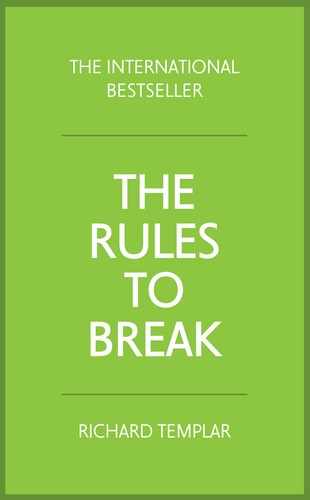RULE TO BREAK
“It’s good to let your feelings out”
A few decades ago you never expressed how you felt. Stiff upper lip and all that. Bottle it up, keep it in, don’t burden others with it. Well, that all seems to have gone by the wayside, and by and large I’ve been happy to wave it a cheery goodbye. It’s certainly healthier to express your feelings than to deny them.
However, just because it’s good for you to say how you feel, that doesn’t mean it’s good to let your emotions out at any time and in any company. There’s a world of difference between having a cry on your best friend’s shoulder – or your mum’s or your partner’s – and sobbing in public or in front of whoever happens to be there at the time.
I have a friend who is an undertaker. He tells me that the most useful warning he can give his clients, when he organizes funerals for the partners or parents, or even children they’ve just lost, is this: ‘Be prepared to spend the whole afternoon comforting people who are less upset than you.’
How did we get from the stiff upper lip, all the way to sobbing inconsolably all over the very person who has just been bereaved – the one who has much more right to be publicly upset than you? That’s the other extreme, and it’s way too far. There’s a selfishness to it that’s almost embarrassing. It’s fine to be upset at a funeral – you’re there because you care – but if you can’t control it you need to keep away from the immediate family.
There’s a modern trend for displaying our emotions freely, as if it makes us a better person. But sometimes* it’s not all about you. Sometimes other people’s emotions are more important than your own, and you need to keep yours in abeyance for a while. You can go home later and sob all over the cat, or phone your best friend for some comfort. While you’re with people who have more cause than you to feel frightened, grief-stricken, upset, anxious, miserable, allow them the space for it without adding to their problems.
This isn’t only about times of deep grief or trauma. It’s all too commonplace, when someone says, ‘I’ve had a dreadful day’, to respond, ‘Tell me about it! My day was a real shocker. First of all …’ It’s presented as empathy, showing that you’ve been there too, but in reality it’s all about taking the focus of attention off the other person and putting it firmly on yourself. As if it’s suddenly a competition to see who’s had the worst day, who can justify the biggest outpouring of emotion.
If someone needs a moan, just listen and sympathize. Don’t compete. I sometimes think we should introduce a new bit of etiquette that says only one person at a time is allowed to have a moan – and it’s first come, first served.
RULE 70
Don’t trample on
other people’s
emotions
